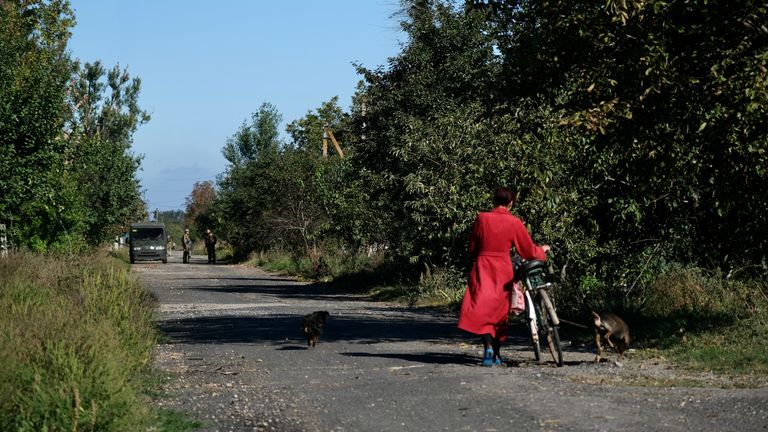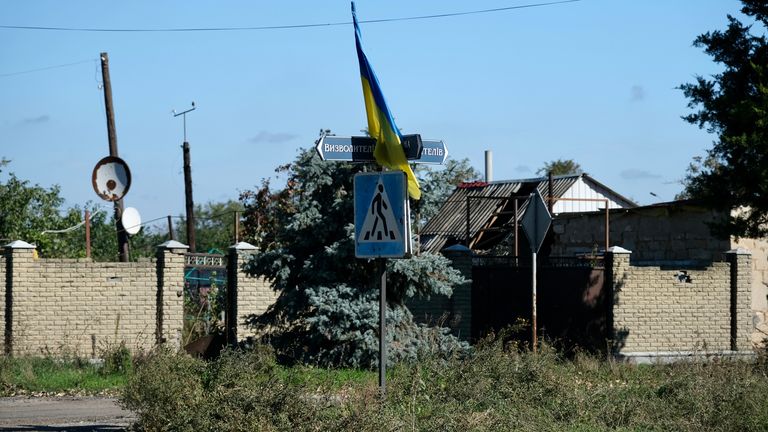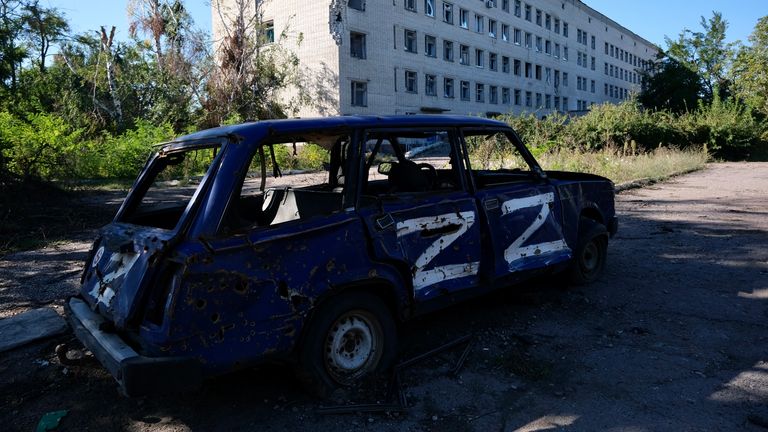The Ukrainian counter-offensive from the south to retake the city of Kherson is known but invisible.
The entire front line was closed to everyone for more than two weeks, indeed it was shrouded in secrecy.
After days of negotiation, the army relented and allowed Sky News to go to the Kherson frontline to see what happened and what is happening.
Liberated towns in the northern countryside revealed potential war crimes, but also experienced a return to normal life.
War crimes “have been committed” according to Ukraine
My first impression as I traverse the outskirts of Vysokopillya and past checkpoints manned by soldiers sheltering under trees rather than the more formal and more common cinder block bunkers, is that this battle proves to be difficult and that it is far from over.
The soldiers are still in far too much danger to set up regular checkpoints.
The Ukrainians may have taken over Vysokopillya and pushed the Russians back on the road, but they are only five kilometers away – in terms of the battlefield, this is a very marginal change.
The city is destroyed, it’s as simple as that really.
Small numbers of people circulate, pushing bicycles through streets littered with glass, rubble, shrapnel, burnt-out cars and vans, and lined with streets of bombed-out houses.
Downtown is eerily quiet, aside from the thump and boom of artillery a short distance away.
The fins of unexploded rockets resemble the metal fronds of a potted plant buried in the ground.
Interesting to watch, but deadly.
Oddly, just down the street, the Russians are overseeing a referendum on whether to incorporate the Kherson region into the Russian Federation.
Until September 5, the inhabitants of Vysokopillya would also have been forced to vote.
Now the people we spoke to dismiss the referendum as ridiculous, and certainly not to them.
Halyna, 65, was hard to miss, walking down the street with her bike and her dog, and wearing a bright red dressing gown.
She looks traumatized, but wants to talk about life here, and the referendum taking place a few miles away.
“The referendum? she said before I could finish my question. “I would never vote for that! I don’t need ‘Russian world’.”
“People there live a normal life in Moscow, Leningrad and other such cities, but in their villages I don’t want this life.”
Read more:
Ukrainian mothers desperately try to find children
Will Russia use nuclear weapons?
Five Britons freed in prisoner swap return to families
The Russians said they would never leave. Residents who stayed or returned speak of living in fear and, more importantly, of systematic and widespread looting.
On the road where the Russians retreated, we filmed a burnt-out van that appeared to have been filled with motorbikes, which were believed to have been stolen.
One of the residents, Bohdan, spoke to me at the door of his house, which itself was badly damaged by the shelling.
He told me that stealing and looting was standard procedure for Russian soldiers.
“They were stealing everything, cars, even bikes, all the technical stuff…everything,” the 71-year-old said.
“If they couldn’t start a car, they towed it away and left nothing behind. They burned and destroyed and broke everything.”
Husband and wife Vasyl and Nadiya also lived under the occupation.
They managed to leave for a while, and have now returned, but they are struggling with what they have been through.
“They abused people, beat them, it was horrible. They wouldn’t let us out of our house,” Nadiya said.
“As soon as we tried to leave, they fired machine guns above our heads, so we had to hide. They were afraid that we would see where they were hiding their machines and their weapons, they even had “graduates “over there, so we just stayed in the basement, because we were afraid to go out.”
“It was so humiliating, I have no words to describe it…”, added her husband Vasyl.
The area hospital was used by the Russians as their headquarters. In front of her, a blue car with the now infamous ‘Z’ painted on the side.
There are a few rows of new graves in the city cemetery for people who died during the occupation and liberation.
Volodya Kostenko showed us around inside. He explained that he joined a group that picked up the dead and buried them.
He wept softly over the graves of a family.
Volodya had used his car and trailer to pick up the bodies. He told us that he brought 13 of them to the cemetery and buried them himself.
Most of those who died were elderly or ill. But he revealed that it was a family that he says was shot, murdered by the Russians.
He has no idea why.
As he spoke, he collapsed, pulled away, and cried.
Few will recover from this war.





